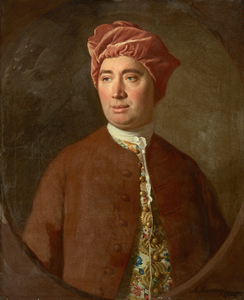by Daniel B. Klein
Hume provides no concise definition of liberty. Meanings must be inferred from his usage.
Nicholas Capaldi led a lively exchange at Liberty Matters on the place of liberty in David Hume, with Andrew Sabl, Chandran Kukathas, Mark Yellin, and myself.
The chief matter of controversy is whether a notion of “mere” liberty–others not messing with one’s stuff–plays a central role in Hume’s outlook and project. Special attention is given to Hume’s six volume History of England.
One entry by Capaldi is titled “Dine at the Table of Liberty, Whine, or Resign,” expressing his view that mere-liberty is central to Hume. I am closely allied to Capaldi. The others reject that mere-liberty was central to Hume.
Sabl, Kukathas, and Yellin tend to suggest that “liberty” in Hume means such things as stable government (authority), established and general rules, parliamentary rights, and so on. As Yellin writes: “Hume says liberty is the perfection of civil society, meaning society under government and the rule of law.”
Capaldi and I agree that liberty in Hume often carries such meanings, but maintain that it also often carries a mere-liberty meaning, that the meanings interrelate, and that mere-liberty is indeed central. Arguments are exchanged by the two sides, arguments both textual and interpretive of Hume’s larger intellectual framework.
Sabl points out that Hume in fact never defines liberty in the mere-liberty sense. Capaldi and I contend that that does not settle the matter. Hume provides no concise definition of liberty. Meanings must be inferred from his usage.
The question arises: If Hume intended to teach a presumption of mere-liberty, why didn’t he say so more directly? I suggest reasons why Hume might be indirect or esoteric about mere-liberty. Kukathas and Sabl reject the suggestion of esotericism in Hume on matters of liberty.
To some extent the disagreement might be over the presuppositions involved in claiming a presumption of liberty. Perhaps Sabl, Kukathas, and Yellin are considering the issue over contexts reaching back many centuries, as treated in Hume’s History, whereas Capaldi and I are more focused on Hume’s political vision for his time, when political stability had been achieved.
Also, to some extent the disagreement might be over a matter of degree: How strong a presumption does Hume mean to give to mere-liberty? Also, what other presumptions does Hume affirm? How do they interact with, even conflict with, a presumption of liberty?
A related issue is whether the provenance of liberty is especially British, or whether British intellectual traditions especially conduced to liberty. Everyone in the exchange agrees that historical practice and conventions reside within any formulation of liberty. Is the British experience, then, central to the story of liberty, even to the idea of liberty? Capaldi says yes, while Kukathas diminishes such claims.
The writings of David Hume will continue to engender argument and disagreement. It was a joy to converse with Capaldi, Sabl, Kukathas, and Yellin. My thinking was altered by the experience.
Daniel Klein is economics professor and JIN Chair at the Mercatus Center, at George Mason University, where he leads a program in Adam Smith. He is author of Knowledge and Coordination: A Liberal Interpretation (OUP, 2012) and chief editor of Econ Journal Watch.


READER COMMENTS
Jon Murphy
Feb 4 2018 at 10:51am
It was a joy to converse with Capaldi, Sabl, Kukathas, and Yellen. My thinking was altered by the experience.
I could not agree more. I found the conversation fascinating. While I am just a newcomer to moral philosophy (having my first deep dive since undergrad last semester with Prof. Klein), I found the conversation both easy to follow and highly informative.
I am really grateful the Liberty Fund brings together scholars like this to discuss all these different matters. I always learn a lot.
Comments are closed.